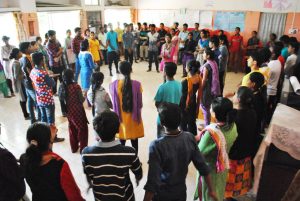 GCJ-Maher Partners facilitated the first ever Maher Youth Camp late last spring, 2017. Coordinators, Gaus Sayad and Mangesh Pol, supervised five senior youths at Maher to run this incredible, intense, fun-filled entire month-long residential leadership development camp for 85 youths from dozens of Maher homes from around the widespread, outlying areas of rural Pune. The curriculum integrated so many things that they learned on our GCJ delegation, including compassionate listening, gender dialogue, and dialogue practices as well as several skills and processes that they had learned from other Maher supporters over the years. But above all, they were led by the ‘secret sauce’ of the magic of Maher’s collaborative ways of being led by unconditional love.
GCJ-Maher Partners facilitated the first ever Maher Youth Camp late last spring, 2017. Coordinators, Gaus Sayad and Mangesh Pol, supervised five senior youths at Maher to run this incredible, intense, fun-filled entire month-long residential leadership development camp for 85 youths from dozens of Maher homes from around the widespread, outlying areas of rural Pune. The curriculum integrated so many things that they learned on our GCJ delegation, including compassionate listening, gender dialogue, and dialogue practices as well as several skills and processes that they had learned from other Maher supporters over the years. But above all, they were led by the ‘secret sauce’ of the magic of Maher’s collaborative ways of being led by unconditional love.
According to 18-year-old camper Mayuri Katkar, “Nowadays we really forget to listen to each other. There is so much love and kindness in just listening to each other. Compassionate listening helps us to listen to each other.”
Camp sessions covered many life skills such as value-based positive thinking, career guidance, anger management, time management, communication skills, compassionate listening, and gender equality, etc., and a range of activities, including dance, drama, meditation, sports, yoga, cooking, craft, youth parliament, and debates. They also planned panels with various professionals and field trips to businesses and NGOs. By the end of the month, the youth felt tremendously bonded and empowered. These youths, who come from families living in impoverished conditions, were groomed to be the next generation of leaders for Maher. They will bring their deepened capacity for listening and building trust and vision to each of their homes in Maher.

Maher Youth Camp
According to 18-year-old camper Mayuri Katkar, “Nowadays we really forget to listen to each other. There is so much love and kindness in just listening to each other. Compassionate listening helps us to listen to each other.”
Camp sessions covered many life skills such as value-based positive thinking, career guidance, anger management, time management, communication skills, compassionate listening, and gender equality, etc., and a range of activities, including dance, drama, meditation, sports, yoga, cooking, craft, youth parliament, and debates. They also planned panels with various professionals and field trips to businesses and NGOs. By the end of the month, the youth felt tremendously bonded and empowered. These youths, who come from families living in impoverished conditions, were groomed to be the next generation of leaders for Maher. They will bring their deepened capacity for listening and building trust and vision to each of their homes in Maher.
Delegate Meera Jadev
Meera Jadev
Global Citizen Journey, Kashmir 2018 – A Life-Changing Journey
Learn more here (NOTE: For those of you in the Seattle area, join us for a inspiring evening on Thursday, 8 March when we’ll share stories from last January’s delegation to India as well as talk about the situation in Kashmir and plans for this upcoming delegation.)
Report from India GCJ Delegation to Maher in Pune
Last years TRIP to India included 24 delegates from the United States, India, Germany, Venezuela, and Spain. To learn more about their experiences, click here and scroll to the bottom of the page.
Quote
Fun Fact/ Quiz
How much does 1 gram of Mongra (highest grade) Kashmiri Saffron cost on Amazon.com?
Answers 2. 44$
News from Partners – Burundi-2
Global Citizen Journey visited Burundi in 2008, but just because the trip ended didn’t mean the engagement with the community did too. To this day, GCJ delegates are partnered with The Carama Women’s Future Association in Burundi, an organization that works with the Carama Widows Association and helps them purchase land so that these powerful women can support themselves and their families financially. To learn more about this amazing organization, visit here or to donate to help with their next land purchase visit here. >> https://www.facebook.com/238561311217/photos/a.10150191650251218.313510.238561311217/10154498186501218/?type=3&theate
Upcoming Trip News Kashmir 2018
Stay tuned for news of Global Citizen Journey’s next adventure to Kashmir, India!
GCJ delegation to Kashmir in 2018!
Global Citizen Journey returns to India with ambitious and adventurous plans to visit one of the most beautiful, diverse, and contested areas of India in September 2018. Most of us know little about Kashmir beyond a vague awareness that it is embroiled in intractable conflict. We will be guided by our local sponsor ELFA International (Education and Livelihood For All) who will connect us with local Kashmiri leaders, nonprofits and organizations so that we can learn, explore, and listen together.
Our goal is to foster dialogue and relationship building and find bases of unity, a common purpose, and a creative process as well as a project that will be meaningful to the Kashmiri people. Read more.
Personal Journey -India